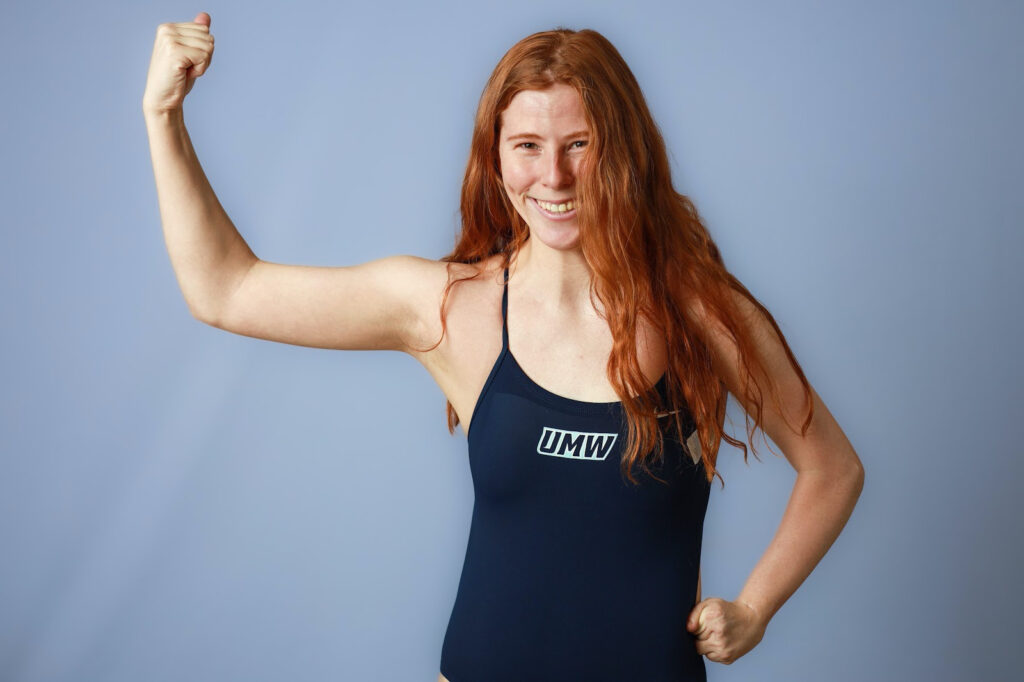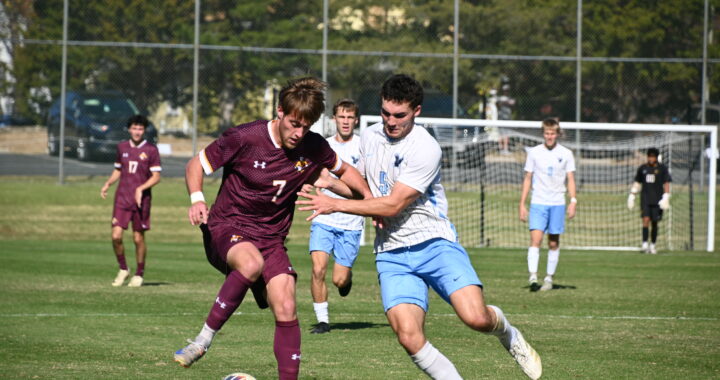Athlete profile: Amanda Sheward swims for Citi Para Swimming World Series 2023
4 min read
Amanda Sheward shows off her muscles. | UMW Athletics
DANIELLE ROSS
Staff Writer
People told her she would never be able to walk or talk. That she would never be able to attend college or swim competitively. But after her first experience at the Bill Keating Jr. Memorial Cincinnati Para Swimming open meet at age 9, Amanda Sheward, diagnosed with left hemiplegia since birth, realized she could prove them all wrong.
At this meet, she met her idol and future mentor, Cortney Jordan, a swimmer with the same disability who has won 12 medals at the Paralympic Games since 2008. Jordan helped Sheward calm her nerves for her first event, the 50 meter freestyle race, and was waiting to cheer her on at the end of the lane. From their first encounter, Jordan has taken her under her wing and has become a valued mentor throughout Sheward’s swimming career.
Sheward hasn’t let anything slow her down since then.
“When I started competing in the Paralympics, I realized that since I have a disability I’m not alone,” said Sheward. “People thought that I couldn’t swim because of my disability, so it’s cool to see myself in the others swimming.”
Sheward, majoring in communication and digital studies, finishes her sophomore year this spring as an athlete on the women’s varsity swim team. While her teammates enter their off season and begin to relax, Sheward is training even more in preparation for the Citi Para Swimming World Series 2023 meet in Minneapolis from April 20–22.
Sheward was born two months prematurely and suffered a stroke in utero, leaving her with a condition called left hemiplegia. This neurological injury has weakened the left side of her body and impacted her motor skills. To try and assist with fitness, physical rehabilitation and other therapeutic benefits, her parents started her with swim therapy at a very young age.
“I learned how to swim before I learned to walk,” said Sheward, who began swimming competitively at age 6.
The pool became her safe place and outlet.
“When I’m swimming, all my worries go away and it’s just me and the water,” she said.
When Sheward was in the eighth grade, she was invited to a swim training summer camp at the University of Virginia. While she was there, one of the swim coaches recommended that she reach out to Justin Anderson, a Paralympic coach as well as the UMW head swim coach. Sheward’s mom reached out and the two connected as he offered guidance and training for her future swimming career. They stayed in touch throughout her high school career; this relationship and support became one of the reasons why she committed to swim at UMW. Sheward also said that she remembers seeing Zach Shattuck, a past assistant swim coach at UMW who competed in the Tokyo Paralympic games, at one of the Paralympic meets wearing a UMW hoodie.
While the world of swimming is naturally inviting and accessible for a variety of individuals, Sheward has found the UMW community to be exceptionally accepting as well. There are certain aspects of the training regimen that she has to change due to her disability, such as swimming shorter distances in practice or modifying the workouts and team lifts, but she takes this all in stride and finds only support from her teammates.
Sophomore teammate Paul Datovech, a business administration and communication and digital studies double major, said that Sheward is easily one of the most hardworking and inspirational people he has met. She brings her positive attitude to every practice and constantly encourages Datovech, along with their other teammates, to do their best at meets.
“UMW swimming would not be a cohesive team without Amanda, and I’m looking forward to two more years with her on the pool deck,” said Datovech.
In preparation for the upcoming World Series meet, Sheward swims six days a week for about two hours daily with Anderson or the assistant coaches, Ryan Sullivan and Grace Gartman. They have been focusing her training on pacing and technique.
“She competes in one of the most competitive Paralympic swimming classifications and continues to make progress each season toward becoming more competitive on the national and international Paralympic swimming levels,” said Anderson. “She’s been working hard toward her events in the 400 free, 100 back and 100 free and has set the foundation to have a great championship meet.”
Although Sheward loves swimming and competing, she said competitiveness with the Paralympic team can be difficult sometimes.
“I know I’m trying to do too much,” she said. “Sometimes I want to do more. Sometimes I want to exceed other people’s expectations for me, but then I realize I have to exceed my own before others.”
Sheward said the most rewarding aspect of her athletic career has been meeting friends from all across the world. That, and dropping time.
“The people make it worthwhile,” said Sheward. “We all motivate and support each other.”
Aside from swimming, Sheward enjoys spending time with friends and writing poetry. In addition to her major, she is also double minoring in journalism and sports management. During the summer, she coaches kids ranging from ages 3–17 at the pool where she also trains.
Sheward does not let her disability stand in the way of any area of her life. If anything, it has greatly contributed to her love for swimming.
“Have fun with whatever you’re doing,” she said. “It doesn’t matter if you’re a sporty person or not.”
Emily Hemphill contributed to reporting for this article.


